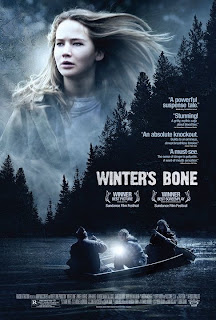There will be a lot of words written about how this film "makes you think"; how it makes you think about marriages which on the surface appear to be happy ones, and then how it (the film) proceeds to reveal the Sweet Little Lies that go on underneath in order to keep up that appearance. This will not be my approach. The idea has been
Twin Peaksed to death. Nothing wrong with that. I'm just one who finds execution more engaging than idea.
Ruriko (
Miki Nakatani) and Satoshi (
Nao Omori) have been married for a few years and have been sexless for about the same. Satoshi, even though he's a little too grown up to be doing so, likes to sleep in and play video games. He doesn't appear to have any real love for his wife but also doesn't object to her much. It's Ruriko who demonstrates, though she may not necessarily have, all the love in the coupling. She's as dutiful as they come. She cooks breakfast, washes windows, and smiles sincerely. Both of them seem to float through life in a daze of WTF, sort of like the way folks taking a high daily dosage of
Valium would. They are both stalked and then drawn into sexual affairs. Ruriko dives into hers the only way she knows how: with detached positivity. Satoshi remains lost in his cloud, but doesn't complain.
For a while I thought this film might fail. Miki Nakatani doesn't strike me as an actress with much range. She's good at contemplative WTF gazes off into space but not much more. Or so I thought. This role is perfect for her and she shines, and director
Hitoshi Yazaki does a great job of capturing her in her strength. There are times when Nakatani brings the film into a surreal,
Stepford Wives atmosphere with her robot-like gazing, and then she'll bust it wide open with a smile that makes you want to go crawling into her arms whimpering "mommy mommy", even though she exudes zero maternal aspects of personality.
Juichi Kobayashi, as Haruo, the man Ririko has an affair with, is a curiosity. He's a dancer, not an actor, so he's used to being adored but doesn't have any acting chops. Doesn't matter. He's a stalker so he's supposed to be creepy, if only mildly, and his role is to serve as an excuse for Nakatani to get emotional. There's great tension in sitting through the improbability of Ruriko actually falling in love with this guy, not just wanting to have sex with him, because, as unbelievable as it might seem, it's the only way Ruriko knows.
Nao Omori is a pleasure to behold as Satoshi. He's hard to figure out because he's so good at playing a man who doesn't have a clue. He's also lucky to have
Chizuru Ikewaki cast as the young woman who innocently, but persistently pursues him. She elevates every film she's in and brings a controlled, mature naivete to her role that works wonderfully alongside Omori's clueless Satoshi. Both of these actors are great casting choices and in many ways, at least as a couple, they are more interesting than Haruo and Ruriko.
Sakura Ando rounds out the cast, in a small role, as Haruo's girlfriend. Yeah, Haruo is a cheater, too.
Hitoshi Yazaki directed one of my all-time favorite films,
Strawberry Shortcakes, so I had pretty high hopes for this one. There were moments in the first act where I wasn't sure if things were going to work out but this is a much different film. It's slower paced and takes a while to bring you into its dreamlike world where appearances appear superficial. The brilliance of it is that when confronted with this obvious superficiality we assume it's masking a cauldron of repressed emotions, but there are no revealed emotions in this film. Nakatani's Ruriko appears to show some emotion, and she has a wonderfully teary-eyed "I Love You" scene, but it's not real. She's just executing the rituals she believes are associated with the set of circumstances. I was premature in thinking I would have to punt my suspension of disbelief at the idea of Ruriko falling in love with her stalker. It's not supposed to be believable. It's just another illusion Ruriko will play a role in.
If only Yazaki hadn't included the scene where Satoshi's sister stops Ruriko, as she attempts an abrupt exit from their afternoon tea to go meet Haruo, and says "Ruriko, you're glowing", my theories would make sense. As it stands, I am completely full of shit. Who cares?
Sweet Little Lies is shot in gorgeously austere and misty shades of gray. There are innumerable scenes in the film full of nuanced and subtle discomfort that will make you shiver. The script is smart, the performances are dazzling, and the film will make you think. Feel free to think about whatever you want.
★★★★★
Director:
Hitoshi Yazaki
Starring:
Miki Nakatani,
Nao Omori,
Chizuru Ikewaki,
Sakura Andô, Juichi Kobayashi
IMDb
Asianmediawiki
Japan Times










